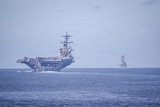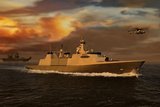Brazilian Navy selects MBDA’s Sea Ceptor
MBDA’s Sea Ceptor has marked a new success, with the system selected for integration onto the Brazilian Navy’s Tamandaré class corvettes. MBDA announced the news on 28 November.
Sea Ceptor will provide local area air defence for the next-generation Tamandaré class corvettes. The system provides all-weather, night and day, 360° local area air defence coverage against multiple simultaneous targets including sea-skimming anti-ship missiles, helicopters and fast combat jets. The weapon is also capable of engaging surface targets.
Sea Ceptor has now been selected by three navies. The UK Ministry of Defence selected the system in September 2013 for its Type 23 frigates and Type 26 Global Combat Ships; and the Royal New Zealand Navy selected Sea Ceptor for its ANZAC Frigate Systems Upgrade (FSU) project in May 2014.
Sea Ceptor’s soft launch technology removes the need for a launcher efflux management system, thereby reducing overall mass and onboard footprint characteristics. This allows greater flexibility for the customer in choosing the weapon’s installation position, a particularly important feature for smaller vessels. It also allows for easy installation as a retrofit on older ships.
More from Naval Warfare
-
![UK’s Fleet Solid Support ship programme deemed on track despite steel supply concerns]()
UK’s Fleet Solid Support ship programme deemed on track despite steel supply concerns
Shipbuilders are saying the programme is going ahead on time as the government estimates 7.7 million tonnes of steel are needed for 2026 infrastructure projects.
-
![As Indonesia doubles up its order, who else is looking at the Arrowhead 140 frigate design?]()
As Indonesia doubles up its order, who else is looking at the Arrowhead 140 frigate design?
The adaptable design of Babcock’s Arrowhead 140 frigate, already selected by the UK Royal Navy and Poland, has led to more orders from Indonesia while other countries continue to weigh it up.
-
![US Navy to invest more than $700 million in laser-related R&D efforts in FY2026]()
US Navy to invest more than $700 million in laser-related R&D efforts in FY2026
The US Navy’s acceleration of its laser weapon development initiatives reflects a decisive shift towards ultimately having a “laser on every ship” across tomorrow’s surface fleet.





















